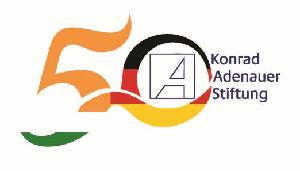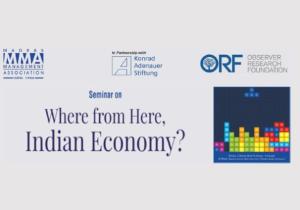Where from here, Indian Economy? - Foundation Office India
Event Reports
Kavitha D. Chitturi, President of the Madras Management Association, mentioned that the state-of-the-art MMA Library at the new MMA Management Centre is being named after Konrad Adenauer, the first Chancellor of the Federal Republic of Germany which is a great honor for MMA. She also acknowledged the outstanding role of MMA through its useful contributions to the nation by unravelling programs and projects to enhance management capabilities in its endeavor to add value to the work-place and the support of Konrad-Adenauer-Stiftung to achieve its objective. Group Captain R. Vijayakumar, Executive Director of MMA, complimented KAS who have completed 50 years of their activities in India and MMA is indeed honored to dedicate the Library to Konrad Adenauer.
Peter Rimmele, Resident Representative to India of Konrad-Adenauer-Stiftung, started his presentation examining the present state of the Indian economy. He acknowledged the current scenario where Indian economy has picked up momentum since 2014 after few years of sluggish growth and it is one of the fastest growth engines in the world. The government has pushed necessary reforms such as demonetization and GST. But the Indian economy is still facing major challenges. Creation of jobs for the young generation is one major challenge. More and more young people will enter the market while the skills the economy needs are changing rapidly because of digitalization and automation. He beckoned the Government to teach them the right skills and prepare them for the job markets as well as to provide them with proper jobs.
K. C. John, President of the Chennai chapter of the IIMA Alumni Association, raised five pertinent questions relating to the Indian economy that included: Can India double the GDP in the next five years? What will it take for India to do that and become a 5 trillion economy? What kind of growth and development that will promote social democracy? How should India carry out structural transformation that yields a sustainable economy? How to address the issue of poverty in India? Should we look at the aggregative view of poverty that dominates the policy discussion in terms of uplifting the population above the poverty line or should we be asking questions which we are shy to ask?
Dr. C. Rangarajan, Former Chairman of the Economic Advisory Council to the Prime Minister and Former Governor of Reserve Bank of India, made an extensive analysis of the economy over the last 2 ½ years with substantiating statistics and events. He spoke in depth about the three stability conditions that fuel the growth engine of the economy namely Balance of Payment Stability, Price Stability and Fiscal Stability. To him, growth is important and growth is a ‘thing’ that gives the surpluses and resources that are required in order to improve some of the social indicators about which the current economy is concerned about. He also dealt at length on the need for increased investments that would fuel growth. He categorically stated that structural changes are bound to happen in a growing economy. According to him, job creation is not something independent of the rate of growth of the economy and that it is more or less synonymous and it depends on the pattern of the growth of economy. Job creation results in growth but you can have growth without job creation in the modern times. With regard to the growing poverty in India, he said, for measuring the performance of the economy in terms of the social development, one must look at some criteria like poverty ratio and see how it has been behaving. He also stated that there is enough evidence to show that the poverty ratio comes down much faster during the period of rapid economic growth.
Professor Narayan, Former Finance Secretary of the Government of India, focused in his presentation on a variety of topics. According to him, energy is going to pose a major challenge with the envisaged rate of growth. The major reason is that India imports around 80% of its primary energy needs, be it petroleum or coal. Second concern was about the financial markets. From 2017 up to now, 43 lakhs crores rupees were made in the stock market and the participation in the financial markets is only about 2% of the population. He also pointed out that India needs to re-evaluate agriculture and bring back a second green revolution.
Prof. Dr. Heribert Dieter, Senior Fellow in the Research Unit on Global Issues at the German Institute for International and Security Affairs, highlighted the mobility issues. He is confident that this part of the world is ideally placed to have electric two wheelers as there is solar power available in abundance. He stated that Indian economy will not develop in isolation from what is happening in the rest of the world.







